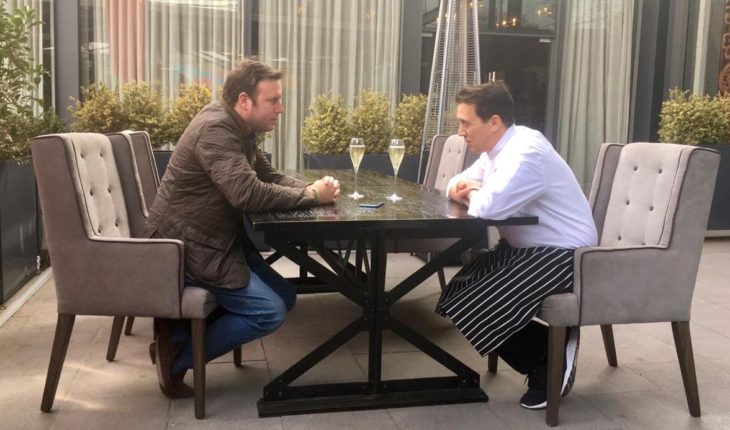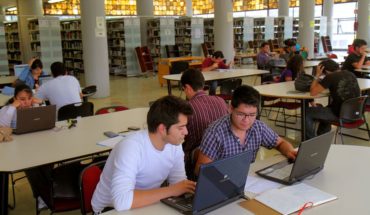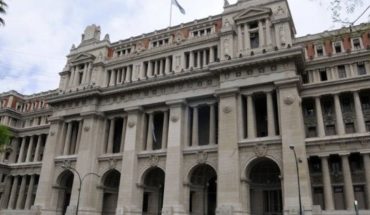It will have been when a day of 1898, Pedro García and Andréa cast Urren decided to remodel a part of his house to create a dining room, taking advantage of the business opportunities that brought the railway to the community of La Rioja in Spain. Perhaps it was in the hands of his mother, Marisa Sanchez, fourth generation of the Family and National Gastronomy award to the best Chef in the year 1987, who was also the source of the traditional menu that is now the gastronomic Hotel Echaurren.
The truth is that Francis Padeny is the crossroads between a famous family history and a call to his own kitchen: he was recognized on 2011 with the same prize that his mother received 24 years earlier. “There are only two families in Spain who have been through that. The Arzak-Juan Mari and his daughter Elena-and I deny them. For us, that we are a small town business of 2,000 inhabitants, that we have happened that is wonderful. It means a lot of commitment to wanting to do things right. And to be recognized is absolutely insane, wonderful. ”
Therefore, there are few people as trained as Francis to speak of traditional Spanish cuisine; He learned it from his mother and mother from his grandmother. Everything to create a family tradition that keeps the Spanish gastronomic tradition alive.
-In my house the kitchen is transmitted from parents to children. Popular, with zero influence from anywhere in the world. The usual kitchen. What was going on? That people came to our house looking for that, because in the cities you found more francized, more international dishes. What happens in the world cuisine and all that extension of French cuisine also occurs in Spain: there the restaurants of the Capitals were francized. I’m going to eat the lobster or the salmon with Meuniere sauce, or the Bellavista salmon, the Turnedó Rossini… The great success of French food is to make the standard of luxury that cuisine on a global level. In my house that does not happen because people come looking for precisely the authenticity, the local, the rural, the products of closeness.
Culture from a dish
But the kitchen, like all art, flows and destroys, reorganizes, reinvents itself. If in France the revolution was brought by the concept of Nouvelle cuisine-stream of haute cuisine focused on light and delicate dishes, with emphasis on presentation-, in Spain was the new Basque cuisine, of which Francis was able to learn firsthand with the pioneers of L With tendency, Juan Mari Arzak and Pierre Subijana.
“Then we had the immense luck that a genius emerges-that we have the immense luck that it is Spanish and that it is dedicated to the kitchen-that is called Ferran Adrià. This guy has provided us with the technological and technical revolution to question everything really. From there all this has happened practically in the last 40 years, “he says.
With these two great blows of innovation, Spain has to work for years. “Each year Ferran surprised us with a new technique. It was a bit tiring: I who worked with him, suddenly appeared with specifications, with airs, with so many techniques that did not let us reflect on them. ”
Now Francis thinks about how that revolution–which meant the new Basque cuisine for Spain and Ferran Adrià for the world–continues to mark the north for chefs around the globe. In Peru, in France, in several Nordic countries.
“I saw Rodolfo Guzmán the other day-I was able to dine at home-with a brutal commitment to his country, to try to rescue flavors. It seems to Me that this is a global phenomenon: there is a knowledge of the technique and there is absolute freedom. ‘ Let us do whatever we want and let each one take his way, ‘ he reflects.
Let’s eat (but really)
While in Spain gastronomic projects are more varied in origin and focus, our country suffers from the effects of centralization. Innovative cuisine is concentrated in the capital, while cooks, dishes and ideas are lost in regions.
-What is happening is a global phenomenon at all levels, and it is absolutely terrible how the whole society is going to live in the cities. Not only in Chile but also around the world: The villages are being left unpopulated and this is a big problem (…) What the nature and rural environment cannot be, is a systematic and filter-free provider of everything the city demands. It has to be a luxury, life provider. Of absolutely authentic things.
For Francis, this attitude is not born as much from not living in rural areas as it does not to think about what we eat. “Sometimes we are more responsible with what we feed our animals than with what we eat. We get into a supermarket and take the first thing it gives us. And we don’t realize sometimes that we just make a technical stop before we get to the supermarket and say ‘ I’m going to take these eggs ‘, I’m making a small territory progress. ‘
-We have to rebel against what they sell us fast. I think people are becoming aware of all this; We’re not going to eat anything anymore. We are going to eat something that is rich and also that has an attitude committed to the planet and society. This is a priority in the rural environment.
Less restaurant, more kitchen
-Do you feel that haute cuisine is becoming more and more disappearing as a business model?
-I think you have to mend: No model is forever. But there have always been luxuries and places where you’ve found the most. What needs to be redefined is luxury: If today we eat Caspian caviar we don’t know what caviar we’re eating. Today there are farms and we do not know what caviar they are giving us, as it turns out that luxury is to eat you fried chicken eggs.
For many revolutions, ideas, new dishes and trends, restaurants are financed with money, not dreams. Francis says that factors such as the value of real estate flats and the cost of human resources too large for projects that may well be small, are undermining the ability to start and maintain local.
-I think the restaurant model should aim to be smaller, with fewer human resources-you have to control it because if it is not untenable-, restaurants of 7 tables maximum, with two or three waiters. Controlling very well: a restaurant cannot be financed, it has to be a business. If you do not fill because you are selling an expensive product with a lot of manipulation, what you can not do is to eat the account of exploitation by human resources.
translated from Spanish: Francis I deny: reinterpreting, Reinventing, reenchanting
May 27, 2019 |





